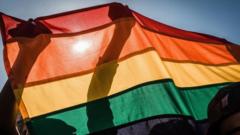The World Bank's decision comes despite ongoing concerns about human rights violations against LGBTQ individuals in Uganda. The organization has announced that it will implement measures aimed at safeguarding the rights of marginalized groups while still providing financial support.
World Bank Rescinds Loan Ban for Uganda Amid Controversial Anti-Gay Legislation

World Bank Rescinds Loan Ban for Uganda Amid Controversial Anti-Gay Legislation
In a surprising policy shift, the World Bank has decided to lift its previous ban on loans to Uganda, imposed due to the country's strict anti-LGBTQ legislation enacted in 2023.
The World Bank has reversed its two-year-long prohibition on funding to Uganda, which was established in response to the nation's harsh laws against homosexuality enacted in 2023. This legislation, viewed as among the strictest globally, subjects those partaking in specific same-sex activities to severe penalties, including the death sentence. Human rights organizations have reported a surge in violence, evictions, and arrests targeting LGBTQ individuals since the law's implementation.
In lifting the ban, the World Bank indicated that it would introduce "mitigation measures" designed to ensure that funding does not inadvertently support discrimination against marginalized communities. A spokesperson emphasized the organization’s mission to alleviate poverty and promote equality, stating that all people must benefit from funded projects. Recent approvals for projects in education, social protection, and support for refugees reflect this commitment.
Experts note the World Bank's vital role as a key financier in Uganda, facilitating significant infrastructure projects. However, some critics argue that the funding mechanisms of international financial institutions may hinder long-term development by trapping nations in dependency cycles.
Despite Uganda’s government asserting that the anti-gay law resonates with local values, critics depict it as a distraction from pressing socio-economic issues. Notably, the legislation has heightened risks for LGBTQ individuals, inciting violence and discrimination.
As this development unfolds, the global community continues to scrutinize Uganda's human rights records and the implications of financial support from institutions like the World Bank in nations with controversial laws.
In lifting the ban, the World Bank indicated that it would introduce "mitigation measures" designed to ensure that funding does not inadvertently support discrimination against marginalized communities. A spokesperson emphasized the organization’s mission to alleviate poverty and promote equality, stating that all people must benefit from funded projects. Recent approvals for projects in education, social protection, and support for refugees reflect this commitment.
Experts note the World Bank's vital role as a key financier in Uganda, facilitating significant infrastructure projects. However, some critics argue that the funding mechanisms of international financial institutions may hinder long-term development by trapping nations in dependency cycles.
Despite Uganda’s government asserting that the anti-gay law resonates with local values, critics depict it as a distraction from pressing socio-economic issues. Notably, the legislation has heightened risks for LGBTQ individuals, inciting violence and discrimination.
As this development unfolds, the global community continues to scrutinize Uganda's human rights records and the implications of financial support from institutions like the World Bank in nations with controversial laws.





















